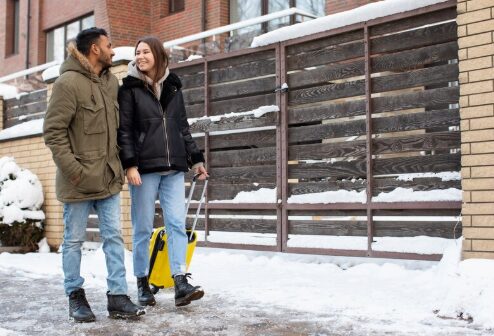A garage door is an essential part of your home, providing security, convenience, and protection for your car and other belongings. However, like any mechanical system, garage doors can experience problems over time. From minor issues like squeaking to major malfunctions, regular garage door repair can prevent costly replacements and keep your door functioning properly. In this article, we’ll explore common garage door problems, tips for maintenance, and when to call a professional for repair.
Common Garage Door Issues and How to Fix Them
Understanding common issues can help you identify problems early and resolve them before they become major headaches. Many problems with garage doors are easy to spot and can be fixed with some basic knowledge and tools.
Why is My Garage Door Not Opening?
One of the most common problems homeowners face is when their garage door won’t open. This issue can be caused by several factors, such as:
- Power issues: Check if the garage door opener is plugged in, and make sure the power supply is working.
- Remote control problems: If the door only fails to open with the remote, the battery may be dead or the remote may need to be reprogrammed.
- Broken springs: If the torsion spring (the large spring above the door) is broken, the door may not open properly. This requires professional repair.
For power and remote issues, simply replacing the batteries or resetting the opener can resolve the problem. However, for broken springs, it’s best to call a professional, as these components can be dangerous to replace on your own.
Solutions for a Noisy Garage Door
If your garage door is making loud, annoying noises, it could be due to a variety of reasons. Some common causes include:
- Dry or worn-out parts: Over time, parts like the rollers, hinges, and tracks can wear out, causing friction and noise.
- Lack of lubrication: If you haven’t lubricated your garage door recently, the metal parts can rub together, creating a squeaky sound.
- Loose hardware: Check for any loose bolts or screws in the door’s track or opener.
To fix a noisy door, apply a silicone-based lubricant to the moving parts of the door, such as the tracks, springs, and rollers. Tighten any loose bolts and ensure the tracks are clear of debris. If the problem persists, a professional garage door technician can inspect and replace worn-out parts.
DIY Garage Door Repair vs. Professional Services
While some garage door repairs can be handled by homeowners, there are situations where hiring a professional is necessary. Knowing when to attempt a DIY fix and when to call for help can save you time and frustration.
What DIY Garage Door Repair Can You Do Safely?
Some minor garage door issues can be safely fixed without professional help. Here are a few things you can try on your own:
- Lubricating the moving parts: Keeping the rollers, springs, and tracks lubricated helps ensure smooth operation.
- Replacing the remote batteries: If your garage door opener is not responding to the remote, try replacing the batteries first.
- Tightening loose bolts: Inspect the door’s tracks, rollers, and hinges for any loose hardware and tighten them with a wrench.
While these tasks are straightforward and safe, be careful when handling torsion springs or the garage door opener motor, as they can be dangerous if mishandled.
When Should You Call a Professional for Garage Door Issues?
Some problems with garage doors should only be tackled by trained professionals. You should call an expert if:
- Broken springs: These are under a lot of tension and can cause serious injury if attempted by an untrained person.
- Off-track doors: If your garage door has come off its track, it can be tricky and dangerous to fix without professional help.
- Motor and opener issues: If the opener is malfunctioning or the motor isn’t working, it’s best to contact a professional for diagnosis and repair.
A professional garage door technician has the experience and tools to handle complex repairs safely and effectively.
Garage Door Maintenance Tips to Avoid Expensive Repairs
Prevention is always better than cure. Regular garage door maintenance can help avoid costly repairs and ensure the door works smoothly for years to come. Here are some tips to maintain your garage door:
Simple Ways to Maintain Your Garage Door
- Inspect the door regularly: Check the door for signs of wear, such as cracks, rust, or loose parts.
- Lubricate moving parts: Use a silicone-based lubricant on the rollers, hinges, and springs to reduce friction.
- Clear the tracks: Ensure the tracks are free from dirt, debris, and other obstacles to prevent jamming.
How Regular Lubrication Can Extend the Life of Your Garage Door
Lubricating your garage door is one of the simplest and most effective ways to prevent issues. By applying a silicone-based lubricant to the moving parts, you reduce friction and wear on the components, helping the door function smoothly. Regular lubrication also helps prevent the buildup of rust, which can lead to corrosion and reduced lifespan of the door.
Understanding Garage Door Opener Problems
Sometimes, the problem with your garage door may be related to the opener rather than the door itself. Here are a few common issues with garage door openers:
How to Troubleshoot Your Garage Door Opener
- Check the power: If the door won’t open, ensure the opener is plugged in and that the circuit breaker isn’t tripped.
- Reprogram the remote: Sometimes, the remote control may need to be reset or reprogrammed to work with the opener.
- Inspect the sensors: Many modern openers have sensors that detect obstacles in the door’s path. If the sensors are misaligned or blocked, the door may not open.
If none of these solutions fix the problem, the opener motor might need to be replaced or repaired. In such cases, it’s best to call a garage door professional to inspect and repair the opener.
When to Replace Your Garage Door: Signs You Need a New One
There comes a time when repairs are no longer sufficient, and replacing your garage door is the best option. Here are some signs that it might be time to replace your door:
What Are the Signs of a Failing Garage Door?
- Excessive wear and tear: If your door is damaged, rusted, or falling apart, it may be time for a replacement.
- Frequent breakdowns: If you constantly need repairs and maintenance, it may be more cost-effective to replace the door.
- Increased noise: If your door is making loud, unnatural noises even after lubrication and repairs, it may be a sign that internal components are worn out.
How to Choose the Right Replacement Garage Door
When choosing a new garage door, consider factors like material, style, insulation, and durability. Steel doors are popular for their strength and security, while wooden doors provide a more traditional, aesthetic look. Be sure to consult with a professional to choose the right style and model that fits your home’s needs.
Conclusion: Maintaining and Repairing Your Garage Door for Long-Term Use
Garage door repair and maintenance are essential for ensuring the smooth operation of your door and avoiding costly issues. Regular inspections, timely repairs, and proper lubrication can go a long way in extending the lifespan of your garage door. Whether you handle simple tasks yourself or seek professional help for more complicated issues, taking care of your door will keep it in good condition for years. If you encounter complex problems like broken springs or opener failures, don’t hesitate to reach out to a qualified garage door technician to get the job done safely and efficiently.



































